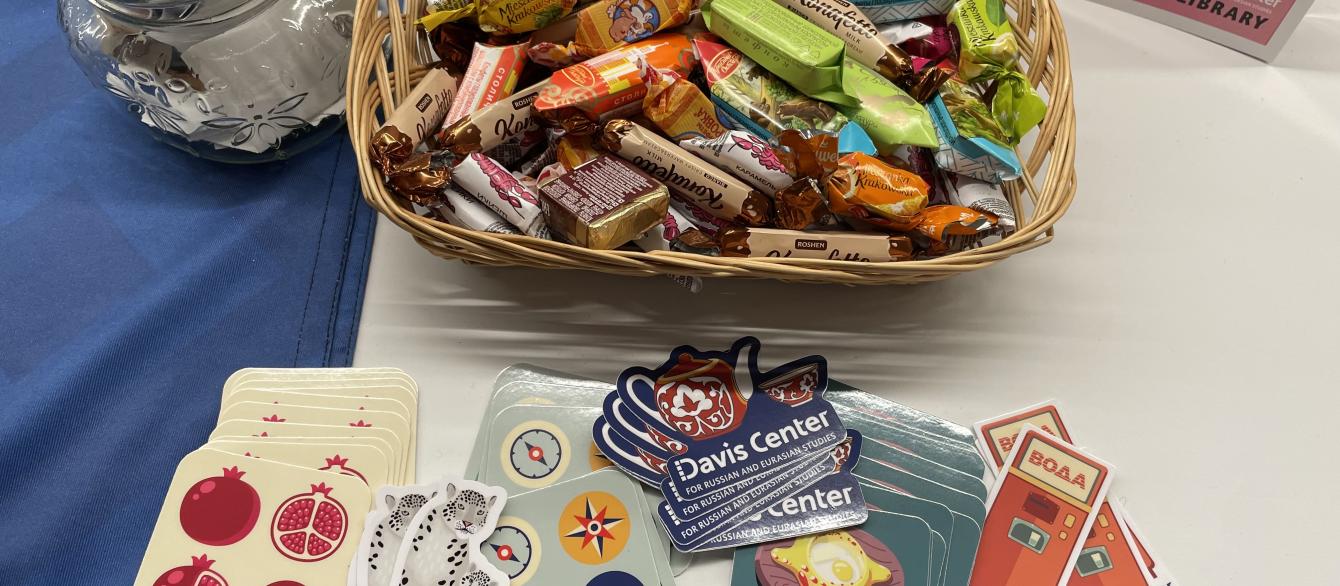The theme at the 2025 convention of the Association for Slavic, East European & Eurasian Studies is “memory”—personal and collective, official and unofficial, studied in all disciplines and historical periods.
Below is a listing of panels and roundtables featuring Davis Center scholars, including our hard-working students. The sessions appear in the order they’re scheduled to take place. Though not exhaustive, the list gives a sense of the astounding variety of interests and depth of expertise to be found within the Davis Center community.
Can’t make it to a talk? Drop by our booth, No. 310 in the Exhibit Hall, and learn more about our work.
Memory Transformation in Crimea: Historian Kelly O’Neill, director of our Imperiia Project, parses papers on Russian imperial bureaucracy, Jewish agricultural settlements, and Crimean Tatar toponymy on the peninsula. Thurs., Nov. 20, 1 p.m.
Ukrainians’ Refugee Experiences: REECA instructor George Soroka and Daniel Epstein of our Scholars Without Borders program present on Ukrainian refugees in Poland and the evolution of Ukrainian national consciousness amid war and exile. Thurs., Nov. 20, 3 p.m.
Reign of Alexander I: Visiting scholar Geoffrey Durham discusses papers on the tsar’s role in European peacemaking, his so-called conservative turn, and the significance of his funeral procession. Fri., Nov. 21, 8 a.m.
Atrocities in Former Yugoslavia: Dr. Sandra Grudic, a genocide scholar and our point person for Educator Outreach, joins a roundtable examining wartime atrocities and the impact of hyper-localized violence on communities. Fri., Nov. 21, 8 a.m.
Contesting Authoritarianism in Georgia: Visiting scholar Ia Eradze reflects on the challenges confronting Georgia’s academic and democratic institutions, as well as possible strategies for protecting and revitalizing democratic practices. Fri., Nov. 21, 10 a.m.
Scholarly Work in Challenging Times: Dr. Epstein joins fellow scholars to consider the challenges stemming from Russia's invasion of Ukraine and changes in U.S. policy, and to look at scholars’ creative solutions. Fri., Nov. 21, 10 a.m.
Central Asian Authoritarianisms: Nargis Kassenova, director of our Program on Central Asia, considers how the differences in the political systems of ex-Soviet Central Asia’s five countries highlight the complexity of authoritarianism in the region. Fri., Nov. 21, 1:30 p.m.
The “Rail War” in Belarus: REECA student Markus Vaher examines Belarusian partisans’ attempts to sabotage national railway infrastructure to disrupt Russian military operations in Ukraine, echoing historical resistance tactics. Fri., Nov. 21, 1:30 p.m.
Asia-Africa Writers Conferences: REECA student Alice Volfson shares research on these Cold War-era forums for cultural exchange and anti-colonial solidarity, exploring tensions between geopolitics and creative autonomy. Fri., Nov. 21, 3:30 p.m.
Energy and Infrastructure in Central Eurasia: Here, Dr. Kassenova discusses papers exploring EU-Chinese trade, American strategic interests in critical minerals, Russian sanctions evasion, and Kazakh nuclear energy and uranium supplies. Fri., Nov. 21, 3:30 p.m.
Ferdowsi in the Soviet Union: Visiting scholar Diego Benning Wang shares research on Soviet approaches to the great Persian poet and to the pre-Bolshevik cultural heritage of the non-Slavic nations of the Soviet empire. Fri., Nov. 21, 3:30 p.m.
Kremlin Propaganda Amid War: Visiting scholar Nadia Boyadjieva discusses global reactions to Russia's full-scale invasion of Ukraine, especially in countries that have either supported the war or refrained from condemning it. Sat., Nov. 22, 10 a.m.
The Politics of Russia’s War Machine: Visiting scholar Irina Busygina explores power dynamics in relations between Moscow and Russia’s regions during the war against Ukraine. Sat., Nov. 22, 2 p.m.
Polish Crisis of 1980-1981: Mark Kramer of our Cold War Studies program shares new findings from the archives of two Polish generals as part of a roundtable marking 45 years since the rise of Poland’s Solidarity movement. Sat., Nov. 22, 2 p.m.
Public-Facing Scholarship: With regional studies facing cutbacks, how do academics share their work with broader audiences? What are the risks and rewards? Nargis Kassenova joins scholars from three other institutions for this roundtable discussion. Sat., Nov. 22, 4 p.m.




